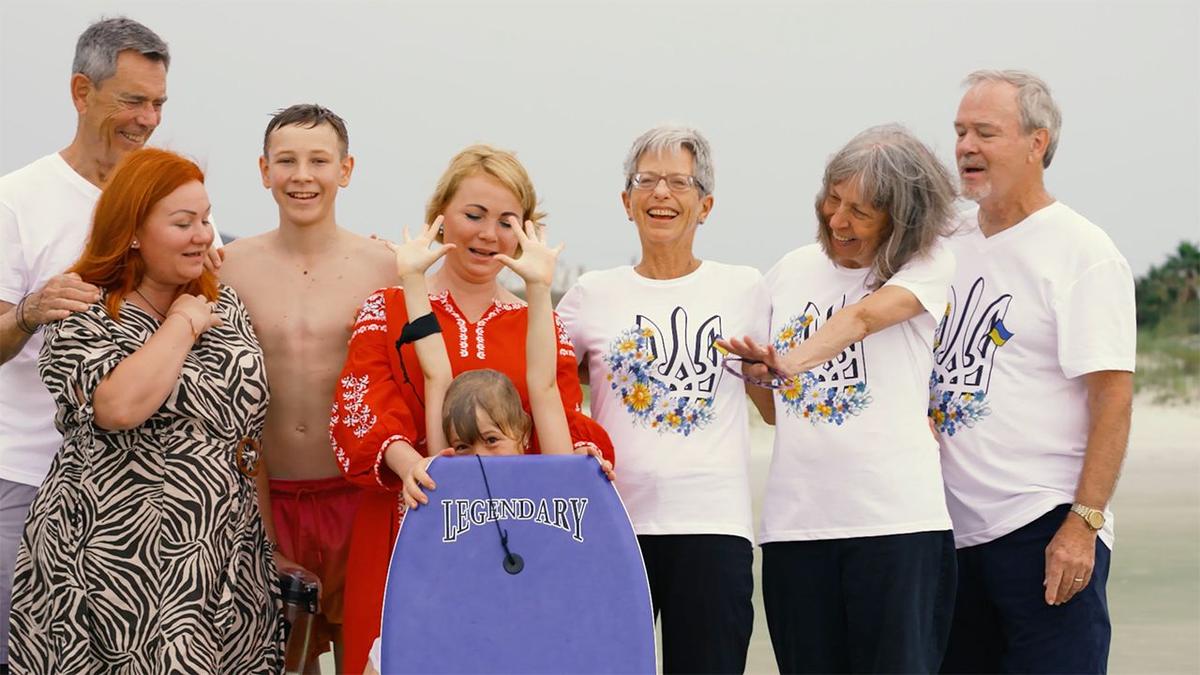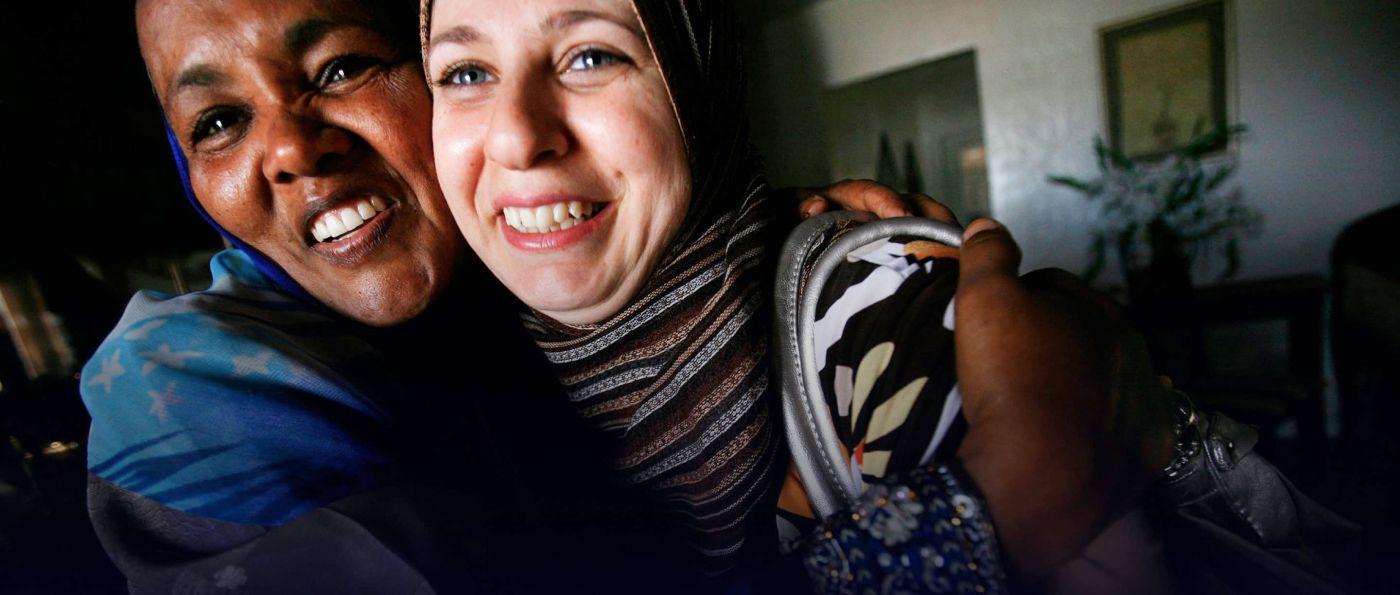
What is Humanitarian Sponsorship?

On March 21, the U.S. government announced that it will terminate existing humanitarian parole status for CHNV newcomers. Learn more.
Humanitarian sponsorship has empowered Americans to provide a bridge to safety for people in crisis.
Humanitarian sponsorship has enabled individual Americans to quickly sponsor newcomers from designated countries and bring them to safety in the United States.
In response to a series of escalating crises, the U.S. government launched the Uniting for Ukraine (U4U) humanitarian sponsorship pathway in 2022, and the Processes for Cubans, Haitians, Nicaraguans, and Venezuelans (CHNV) in 2023.
The U.S. Citizenship and Immigration Services (USCIS) in the Department of Homeland Security (DHS) operated both programs.
The impact of humanitarian sponsorship
Americans across 12,000 zip codes in all 50 states changed lives through sponsorship.
Humanitarian sponsorship policy changes
As of Jan. 28, 2025, the Department of Homeland Security (DHS) has ended the Processes for Cubans, Haitians, Nicaraguans, and Venezuelans (CHNV) program and paused the Uniting for Ukraine (U4U) program. Neither program is accepting new applications, pending applications will not be processed, and no new travel authorization will be issued.
In addition, DHS announced that immigration officials may start reviewing the cases of people in the United States on humanitarian parole.
As part of that review, officials may decide to end an individual’s parole status and could begin the process of removing them from the United States. This announcement could include people who arrived through humanitarian parole processes for Cubans, Haitians, Nicaraguans, Venezuelans, Ukrainians and Afghans.
How does the executive order work, and what does it mean for sponsors and newcomers?
Humanitarian parole is a temporary immigration status that allows individuals facing urgent humanitarian crises to enter the U.S. legally. It is a discretionary status that can be granted or ended at any time by executive order of the president.
On Jan. 23, 2025, the Department of Homeland Security issued a notice directing immigration officials to review cases of individuals who are currently in the United States on humanitarian parole to determine whether to terminate their parole status and begin the process to remove them from the United States back to their home country. This includes beneficiaries of Processes for Cubans, Haitians, Nicaraguans, and Venezuelans and, possibly, Uniting for Ukraine as well as Afghans with parole status.
We do not yet know how this guidance will be implemented or enforced, but we will share updates as we receive more information.
Newcomers with humanitarian parole status should apply for a more durable status as quickly as possible, ideally asylum if they are eligible. In general, deportation efforts are not directed at those who have a pending asylum application. Please consult our guide to alternative legal status options.
Sponsors seeking information about applications they have submitted may seek constituent services from their congressional representatives to inquire about the status of their application or share their support for sponsorship programs. Click here to consult our sponsor guide on contacting your congressional representative for help.
What’s the latest on CHNV?
On June 12, 2025, the Department of Homeland Security announced that it began sending termination notices for humanitarian parole status and work authorization to individuals who arrived in the U.S. through the Processes for Cubans, Haitians, Nicaraguans, and Venezuelans (CHNV) sponsorship program.
Individuals affected received notification through their myUSCIS account.
If a newcomer you know has been impacted by this decision:
- Get legal help immediately: All individuals with a primary status of humanitarian parole should consult an immigration attorney immediately. Find an immigration attorney through the American Immigration Lawyers’ Association search tool.
- Consult our parole termination resources hub, which includes resources to understand newcomers’ rights and possible next steps.
- Sponsors can consult our guide to alternative legal options for humanitarian parolees to seek professional legal counsel.
What’s the latest on U4U?
As of Jan. 28, 2025, the U.S. government has paused the Uniting for Ukraine (U4U) program. No new U4U applications are being accepted, pending cases won’t be processed, and no new travel authorizations are being issued.
In Aug. 2025, U.S. Citizenship and Immigration Services (USCIS) resumed processing U4U renewal (re-parole) applications for Ukrainians who are here in the U.S. Ukrainian newcomers who have already arrived in the U.S. via U4U may be eligible for re-parole. However, the pause on new U4U applications for Ukrainians outside of the U.S. is still in place. For more information, see this guidance by the Ukraine Immigration Task Force on how to submit a re-parole application and when to consider expedited processing.
If your U4U beneficiary is still awaiting a renewal for parole or work authorization, we encourage you to contact your congressional representative and submit a constituency request for their staff to file a congressional inquiry to USCIS checking on the status of their case. You can reference our contact your representative guide to learn how to submit this request.
To understand eligibility for alternative legal status options, check out our guide to alternative legal options for humanitarian parolees and seek legal advice from an immigration attorney.
Does the end of the CHNV program and pause to the U4U program mean the newcomer I sponsored lost their humanitarian parole status?
The DHS announced that it will terminate the humanitarian parole status for individuals who arrived in the U.S. through the CHNV program. Termination of parole will take effect 30 days after the official notice is published. The expected publication date of the notice is March 25, 2025, meaning parole would be terminated on April 24, 2025. Additionally, if an individual's parole is set to expire earlier, termination would occur on the expiration date. DHS intends to prioritize removing individuals from the U.S. who haven’t applied for another status, like TPS or asylum, by March 25, 2025. View our CHNV policy explainer page for more information and resources.
This order of termination is specific to individuals who were sponsored through the CHNV sponsorship program. It does not apply to individuals who arrived in the U.S. through U4U, however recent reports suggest the government may also terminate humanitarian parole status for this population. Individuals who arrived through U4U and do not have another status or a pending application for another status, such as TPS or asylum, should seek professional legal counsel and apply for alternative legal status, if eligible. Learn more about applying for another status in our guide to alternative legal options for humanitarian parolees.


